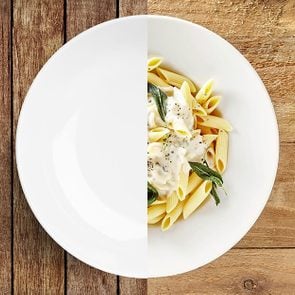What Is Fasting? 9 Things Medical Experts Need You to Know
Updated: Nov. 04, 2020
Fasting is a period of time where you refrain from eating food. Before you start a fast, here's what medical experts want you to know.
Fasting is in the news more these days thanks to the popularity of intermittent fasting, which has many vocal supporters and its laundry list of potential benefits, including weight loss, heart health, and even longevity. But what exactly is fasting, and does it deserve all the accolades and health claims?
Fasting is “the voluntary abstinence of some or all caloric foods or beverages for therapeutic, spiritual or political reasons,” as one group of researchers in a 2018 BMC Complementary and Alternative Medicine study defined it. The various types of fasting differ mainly in terms of what you can—or can’t—eat and when you can or can’t eat it. Each type of fast has its own list of benefits and risks that must be carefully considered based on your underlying health status and goals.
Fasting is very, very old
First of all, fasting is literally as old as time, explains intermittent fasting advocate Mark P. Mattson, adjunct professor, neuroscience, Johns Hopkins University School of Medicine, Baltimore. In prehistoric days, our ancestors ate when there was food and essentially fasted when there wasn’t, he says. “Our organ systems evolved so they function well on intermittent feedings,” says Mattson. “Individuals who weren’t able to function when food was scarce, starved and didn’t pass their genes on. It was survival of the fittest.”

Fasting isn’t only about weight
The concept of fasting isn’t always centered around weight loss or maintenance. Hunger strikes have long been used as a form of non-violent protest to call attention to perceived wrongdoings of a government, for example. Indian leader Mahatma Gandhi went on hunger strikes for up to three weeks at a time between 1913 and 1948 to protest British rule.
Religious observances
Some religions encourage periods of fasting. Muslims are required to abstain from food and drink from dawn to dusk for 30 days of Ramadan to remind them of the less fortunate and reinforce the need for gratitude. For Yom Kippur, the Jewish faith calls for a fast from sundown until nightfall on the following evening to observe a day of atonement. The Greek Orthodox Christians fast for a total of 180-200 days each year, including Nativity Fast, Lent, and the Assumption; most of these fasts involve giving up meat for specific periods of time. Members of The Church of Jesus Christ of Latter-day Saints, also known as Mormons, typically fast one Sunday each month for up to 24 hours. These religious customs serve as models for dry fasting methods.
Surgery prep
Fasting is also part of surgery prep. If you are undergoing surgery or any type of procedure that involves anesthesia, you will be asked to fast. This is to stave off nausea and make sure no food or liquid gets into the lungs. Follow your surgeon’s specific instructions on when to stop eating or drinking, and make sure you know the rules for drinking water while fasting if you are scheduled for a procedure.
Types of fasting for weight loss
Fasting takes many forms, and some of them fall under the umbrella of intermittent fasting, such as alternate-day fasting, time-restricted eating, and modified fasting. Others are for cleanses or other types of diet plans.
Alternate day fasting
In alternate-day fasting, you eat every other day and consume no or few calories on the days in between. Some alternate-day fasting schedules restrict calories during the week but not on weekends. In one year-long study of 100 women, those in the alternate-day fasting group and those in a daily calorie-restriction group saw similar weight loss benefits, weight maintenance, and heart disease risk factors.
Time-restricted fasting
Time-restricted feeding is another type of intermittent fast. It limits the times of the day that you can eat. People who practice time-restricted eating typically eat during an eight to 12-hour daytime window and fast during the remaining 12 to 16 hours. This is sometimes called the 16/8 method. Some fasters opt for the 24-hour fast and don’t eat for a full day. It’s not a free-for-all during the “on” hours, Mattson explains. Instead, healthy meals and snacks should be consumed during this window. (Here’s everything you need to know about the Warrior Diet, a more severe version of time-restricted eating.)
Modified fasts
Modified fasts like the 5:2 fast involve eating just 20 to 25 percent of your regular calories on fasting days. For some, this may mean just 500 calories, Mattson explains. The 5:2 fast calls for fasting two days per week and following your usual eating patterns on the other five days of the week. Results of studies are mixed as to whether this way of eating produces weight loss, according to the Academy of Nutrition and Dietetics.
Water-only fasts
Water-only fasts were promoted as treatment for obesity in the 1960s and 1970s. There are many ways to do a water fast, with the difference being primarily how long you consume only water, with some medically-supervised water fasts lasting up to 10 days. Most water fasts span 24 to 72 hours. Water fasts can be a shock to the system so they often involve some prep work. “The scale will go down, but it’s just water weight from dehydration,” says Scott Kahan, MD, director, National Center for Weight and Wellness, Washington, D.C. Here’s more on what medical experts need you to know about water fasting.
Juice cleanses or juice fasts
Sometimes called a juice cleanse, juice fasts refer to a period of three to 10 days when a person’s diet consists mainly of fruit and vegetable juices. These fasts are often referred to as detoxifying and claim to aid weight loss. Will you lose weight on a juice cleanse? Probably, as these cleanses are likely lower in calories than your normal diet. But the risks of juice fasts should not be understated, Kahan warns. Some juices contain spinach which is high in oxalates and can cause painful kidney stones, he says. Other risks include dehydration and electrolyte disturbances, which are marked by fatigue, headache, and other symptoms. (Make sure you know how lemon water can affect your fast.)
Calorie restriction
Calorie restriction is a type of fasting, Dr. Kahan says. Caloric restriction fasts involve limiting the number of calories that you consume for specific periods of time. These diets tend to comprise anywhere from 800 to 1,200 calories per day depending on your weight and gender, Dr. Kahan says. “People are treated with meal replacement supplements like bars or shakes that are well balanced with protein, fiber, vitamins, and minerals.”
These fasts work, he says. “It has been shown to be safe and really help people take off weight, and even reverse diabetes,” he explains. But this is only a short-term fix. “Hopefully you will develop some skills and build some strategies to help you keep the weight off for the longer term,” says Dr. Kahan.
Keto diets, extremely low-fat diets, and other eating plans that dramatically reduce or eliminate the amounts of carbs or fats—a.k.a. macronutrients—you consume are considered a type of fast too, Dr. Kahan says. “Very low-carb or very low-fat diets can work well, but it’s really because they provide fewer calories.”

Quick things to know before trying fasting
While fasting may offer some health benefits, it’s not a great idea to jump right in to a fast, warns Dr. Kahan. Regardless of the reason you’re considering fasting, it’s always a good idea to run it by your doctor first, he says. Here are some of the benefits and concerns with fasting.
Fasting may promote fat burning
This is the hope and promise of intermittent fasting, says Mattson. When your fast, your body uses up the glucose stored on your liver for energy. “Then you start burning fat for energy.” This is called ketosis, and it can lead to weight loss. The three-meals-a-day eating pattern and snacks favored by Americans doesn’t allow bodies to run through their liver’s energy stores and make the switch to fat-burning, he says.
Fasting may provide mental clarity
Research shows that intermittent fasting boosts working memory in animals and verbal memory in adult humans, Mattson says. He points to research on 220 healthy, non-obese adults who stayed on a calorie-restricted diet for two years: They showed signs of improved memory in a battery of cognitive tests. Exactly how or even if fasting improves memory is not fully understood, but research is ongoing, he notes.
Fasting does spur weight loss
But likely only in the short term, Dr. Kahan says. If you go back to your normal way of eating after a fast, you’re likely to regain some or all of the weight that you lost. A 2017 study in Circulation points out that fasting regimens may result in weight loss for the short term and may lower blood cholesterol levels. The group cautions that there is isn’t enough evidence to determine whether it’s effective long term.
Fasting may have some health benefits
A lot of the research on fasting has been done with animals and is tough to apply to people. However, there is a growing body of literature on how it affects humans that suggests certain types of fasting may help improve your cholesterol, blood pressure, blood sugar or glucose levels, insulin sensitivity, and other health issues. (Just be aware that the benefits of intermittent fasting may be different for women.)
Routine fasters may live longer
It’s true, according to two studies presented at the 2019 meeting of the American Heart Association. One study of heart patients included 389 “routine fasters” who had been fasting regularly for at least five years. The routine fasters had a 45 percent reduced risk of dying compared with the non-fasters during the follow-up period. The study was conducted in heart disease patients from Utah and other Rocky Mountain states and included members of The Church of Jesus Christ of Latter-day Saints, also known as Mormons, who typically fast one Sunday each month for up to 24 hours.
A second fasting study of the same group showed routine fasters had a 71 percent lower rate of heart failure than non-fasters. The study was observational so it doesn’t prove cause and effect, but fasting could be a marker for an otherwise healthy lifestyle or it could spur other positive changes.
Fasting may cause side effects
In general, all types of fasting can cause headaches, fainting, weakness, and dehydration. Risks vary based on the type of fast. Certain juice fasts may increase the risk for kidney stones, for example, Dr. Kahan says.
You will be hungry…at first
Mattson has been an intermittent faster for decades. “I basically skip breakfast,” he says of his time-restricted approach. Meal skipping is considered a form of fasting. “When you first start skipping breakfast, you will be hungry in the morning but in several weeks, you won’t be hungry in the morning anymore.”
What you eat before and after a fast matters
Advocates suggest eating healthy foods before a fast, including fruits, vegetables, and lean protein, and steering clear of foods that are high in sodium, which may cause bloating. When you have completed your fast, gradually reintroduce foods so that you don’t overdo it, Dr. Kahan suggests. Learn more about what you’re allowed to drink while fasting.
The structure of fasting can be beneficial
For some people who struggle with their weight, the structure provided by certain types of fasts can help them stay the course. “If you have a basic set of rules, such as ‘I can only eat from 11 am to 6 pm,’ that can be a valuable structure,” Dr. Kahan says. “If you can do that reasonably and make healthy choices, you can get benefits.” The issues arise when people start to think fasting is magical and that they can eat whatever they want during these hours because their body is a fat-burning machine.”
Fasting is not for everyone
The list of people who should not fast includes anyone under the age of 25, women who are pregnant or breastfeeding, people with diabetes who are taking medication to control their blood sugar, individuals with a seizure disorder, and those who operate heavy machinery on the job. “If you have an eating order, intermittent fasting is not recommended,” Dr. Kahan says. “If you have a binge-eating disorder, any type of restrictive eating tends to incite more binging,” he says.




















